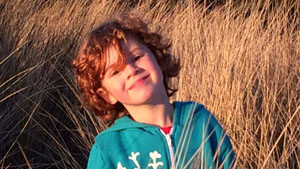A Stanford researcher is among those tracking and treating cases of California children who have developed sudden-onset, permanent paralysis that looks similar to polio.
March 10, 2014 - By Erin Digitale

Sofia Jarvis is among roughly 20 children in California who have developed sudden-onset, permanent paralysis similar to polio. Courtesy of Jessica Tomei and Jeff Jarvis.
Jessica Tomei remembers the exact moment her daughter's arm stopped functioning.
It had been a rough week. Her daughter Sofia Jarvis, then 2, had been sick with a respiratory illness. Tomei and Sofia were leaving the pediatrician's office with a pneumonia diagnosis and a prescription for antibiotics when, on the way out, Sofia reached for a toy.
"Her left arm, in midgrasp, stopped working," Tomei said.
The next day, when Sofia was still not using her arm, Tomei and husband Jeff Jarvis took her back to the doctor. An MRI showed a lesion in Sofia's spinal cord. At first, she was diagnosed with transverse myelitis, a form of paralysis from which some patients recover. But when the family eventually found their way to pediatric neurologist Keith Van Haren, MD, at Lucile Packard Children's Hospital Stanford, he had bad news.
"Dr. Van Haren immediately said, 'She probably will not get back the function of her arm,'" Tomei recalled.
Sofia's case fit into a pattern that Van Haren, who also is an instructor of neurology and neurological sciences at the School of Medicine, and other neurologists around California had begun to observe: Since late 2012, about 20 children in the state have developed sudden-onset, permanent paralysis that looks similar to polio. Van Haren is the lead author of an abstract that describes five of the cases. The abstract will be presented during the annual meeting of the American Academy of Neurology, April 26 to May 3, in Philadelphia.
"Although poliovirus has been eradicated from most of the globe, other viruses can also injure the spine, leading to a polio-like syndrome," Van Haren said in a news release from the academy. "In the past decade, newly identified strains of enterovirus have been linked to polio-like outbreaks among children in Asia and Australia. These five new cases highlight the possibility of an emerging infectious polio-like syndrome in California."

Keith Van Haren
All five of the children in the report, including Sofia, had been immunized against polio. In addition to Sofia, two others had respiratory symptoms before the paralysis began. In two of the children, the physicians found evidence of infection with enterovirus-68, which is from the same family as poliovirus. Although the team suspects this form of paralysis is infectious, they have not completely excluded other causes such as autoimmune disease. They are asking other physicians to report similar cases to the California Department of Public Health so that the cause of the disease can be pinpointed.
One concern, Van Haren added, is that physicians who have not heard of the new disease may make the same misdiagnosis of transverse myelitis that Sofia received, giving affected children and their families unrealistic expectations about the likelihood of recovery.
"The MRI can look similar, but the clinical exam is very distinct," he said. "There's a knee-jerk reaction to just call it transverse myelitis. This is something else, and it's quite bad."
The good news is that the disease is very rare and likely to remain so. "There have been similar reports in Southeast Asia for many years, and the disease has rarely reached epidemic proportions there," Van Haren said. "We want to temper the concern about this. It is not a massive epidemic."
Meanwhile, families like Sofia's will be watching closely to see what is uncovered by the upcoming research.
"We really want to know what caused this," Jessica Tomei said, adding that the disease and a string of attempted treatments have been difficult for Sofia to go through. Now 4, Sofia is generally healthy, but her arm is still paralyzed, and the muscles have begun to atrophy.
Still, the family is keeping a positive outlook. "We're lucky it was just her left arm," Tomei said.
About Stanford Medicine
Stanford Medicine is an integrated academic health system comprising the Stanford School of Medicine and adult and pediatric health care delivery systems. Together, they harness the full potential of biomedicine through collaborative research, education and clinical care for patients. For more information, please visit med.stanford.edu.